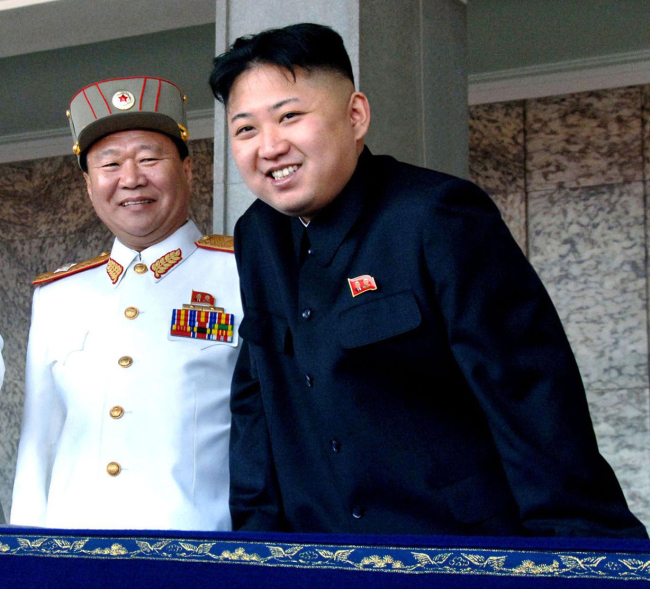North Korean leader Kim Jong-un on Wednesday sent a special envoy to Beijing in an apparent effort to mend fences with its ally ahead of China’s summits next month with the U.S. and South Korea.
Choe Ryong-hae, the director of the General Political Bureau of the North’s Korean People’s Army, flew to Beijing ― the first high-level visit since Jang Song-thaek, the vice chairman of the National Defense Commission, went there in August.
The North’s official Korean Central News Agency reported that Choe departed for Beijing as a special envoy of the North Korean leader, but did not elaborate on any details about the surprise trip.
The North’s airliner Air Koryo carrying the delegation led by Choe touched down at Beijing Capital International Airport at 10:30 a.m. He is expected to meet with top Chinese officials including new President Xi Jinping and State Councilor Yang Jiechi.
A civilian-turned-military leader, Choe, 63, is one of the closet confidants of the third-generation autocratic ruler. The General Political Bureau he has led since April last year is seen as arguably the most influential organ of the 1.19-milion-strong military that oversees critical personnel affairs.
Choe’s trip could serve to create crucial momentum for both bilateral and multilateral talks that could help ease military tensions aggravated by Pyongyang’s nuclear and missile tests, which have put them in deeper international isolation, experts said.
They also noted the North appeared to be in a rush to mend fences with its only major ally China as U.S. President Barack Obama and Xi are slated to hold their first summit in California on June 7. South Korean President Park Geun-hye is expected to meet Xi in China in late June.
Since Pyongyang carried out its third nuclear test in February in defiance of international criticism, its ties with Beijing have deteriorated. China has joined the U.N. sanctions to punish the atomic test and several of its banks have stopped doing business with North Korean firms to observe the international sanctions.
All this has led China watchers to presume China has begun to realign its strategic thinking over the recalcitrant ally whose bellicose behavior has been antithetical to its long-term national interests.
“Choe’s trip to Beijing appears to be a prelude to North Korea’s efforts to restore bilateral ties with China and show to the outside world that their relationship still remains intimate and sturdy,” said Kim Young-soo, North Korea expert at Sogang University.
“He would listen to the new Chinese leadership’s opinions (about the bilateral ties) and might also discuss Kim Jong-un’s visit to China for a summit meeting with Xi. Kim, of course, wants to meet Xi before Park of the South meets the Chinese president.”
Park Hyeong-jung, a senior research fellow at the Korea Institute for National Unification, noted there was a sense of urgency on the part of Pyongyang as Seoul seeks to enhance its relationship with Beijing without focusing only on its 60-year alliance with Washington.
“Pyongyang appeared to have felt that it was urgent to restore ties with Beijing as President Park is to meet Xi next month and the relationship between Seoul and Beijing is strengthening,” he said.
Noting Choe as a military representative might focus primarily on security affairs such as nuclear and missile issues during his stay in Beijing, Park raised the possibility that Beijing might have asked Pyongyang to stop provocative actions in return for accepting the envoy.
“There had been no envoy exchanges for some time as their relationship worsened due to North Korean provocations. The fact that China had accepted the envoy indicated that Beijing might have asked for something in return, which could be a demand for the North to stop action that could escalate tension on the peninsula,” he said.
The dispatch of a North Korean envoy also indicates both Pyongyang and Beijing share the critical interests in enhancing their bilateral relationship, said Huh Moon-young, a senior research fellow at KINU.
“For China, North Korea is still a crucial partner or ally, particularly as the Sino-U.S. rivalry intensifies, and at the same time, Pyongyang cannot live alone with its back turned against Beijing,” he said.
“From my perspective, should the bilateral ties be seriously damaged, it would be much more difficult to rein in the North and the regional security landscape would become much more unstable.”
Some observers noted that as the North was seeking to enhance ties with China and Japan, South Korea could lose its strategic leverage over its northern neighbor, at a time when the fate of the joint industrial park in Gaeseong, the only remaining symbol of inter-Korean economic cooperation, hangs in the balance.
Japanese Prime Minister Shinzo Abe sent an aide to the North last week to discuss the issue of Japanese kidnapped by the North.
By Song Sang-ho
(
sshluck@heraldcorp.com)








